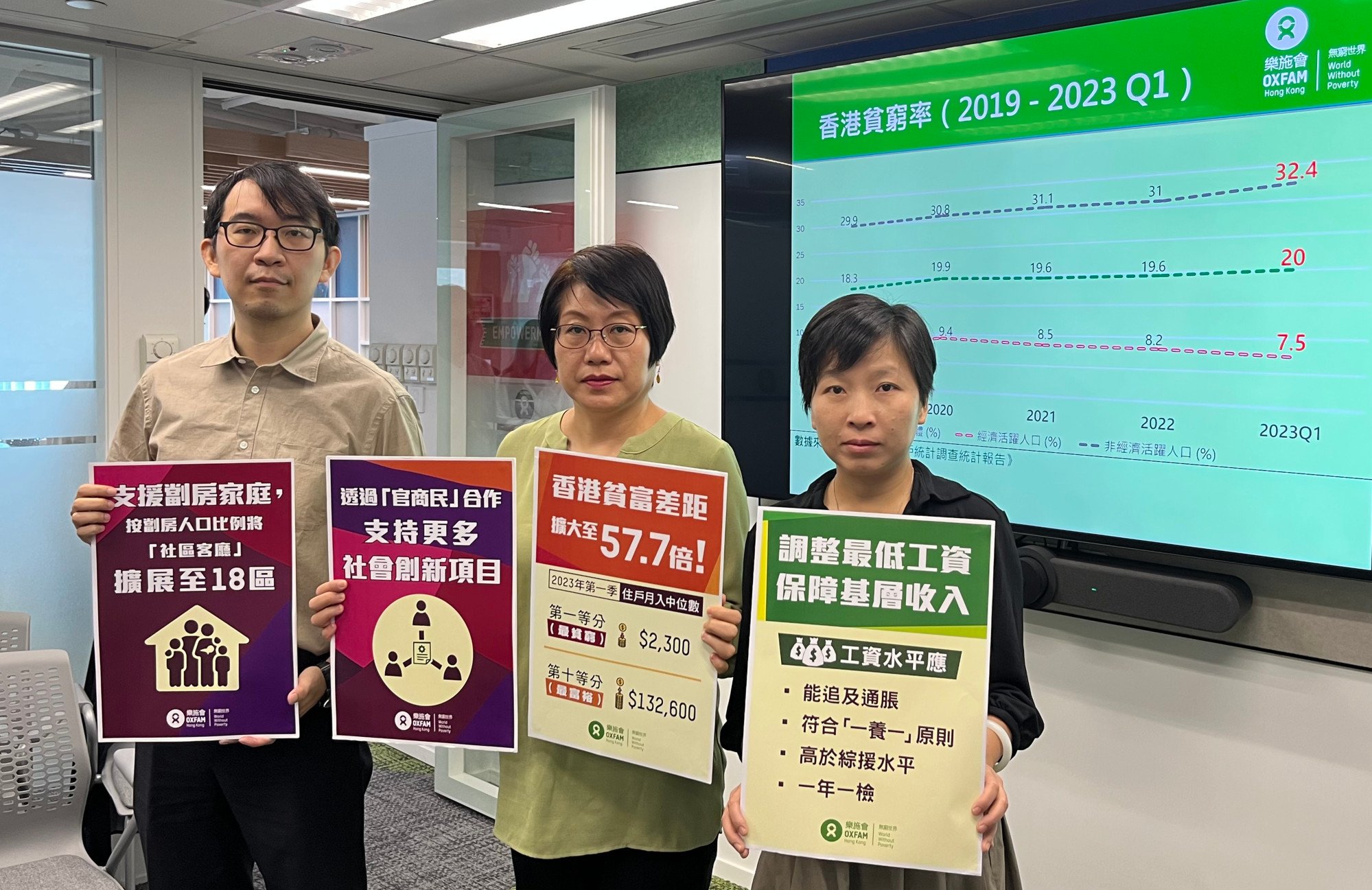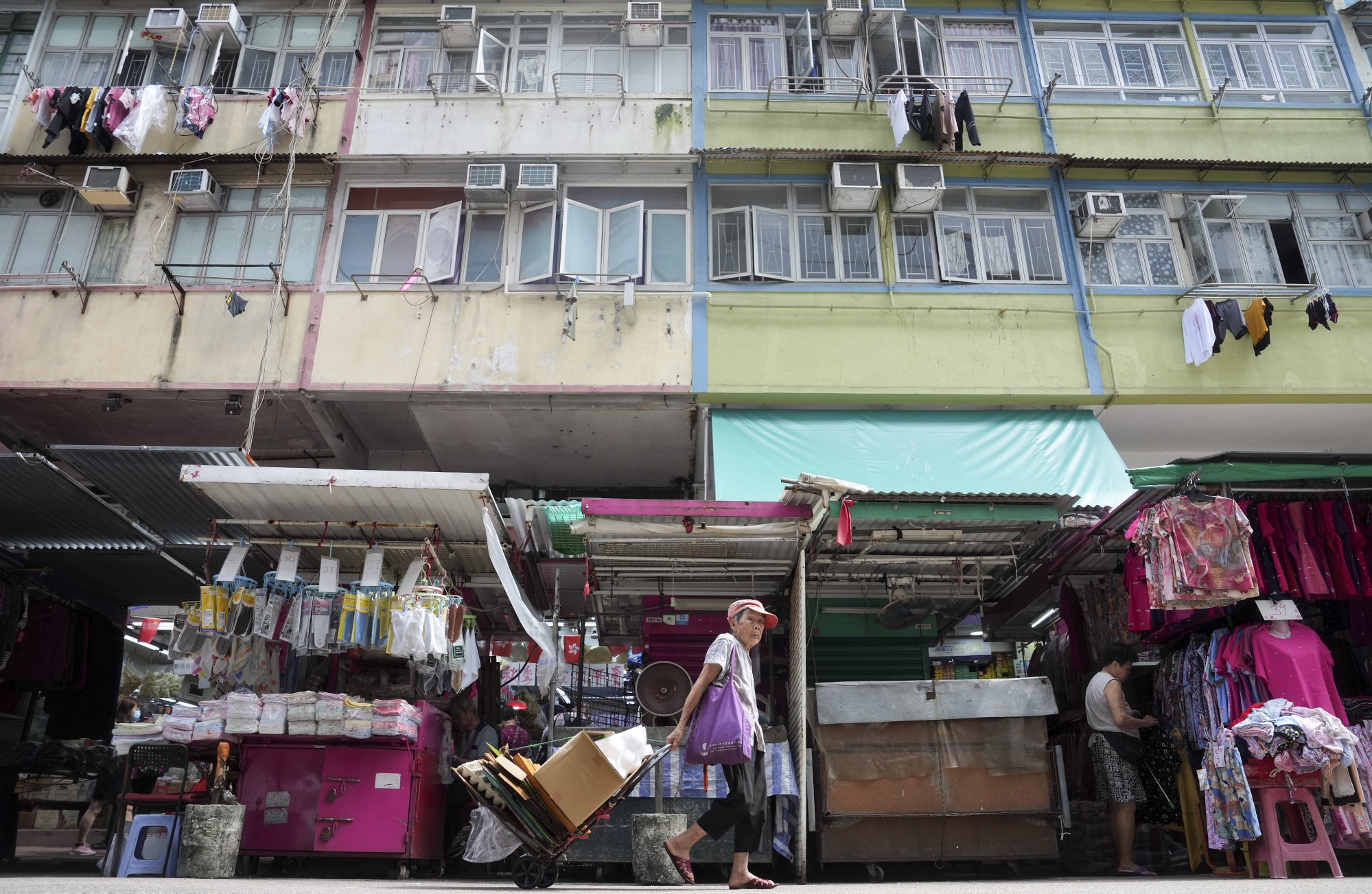
Hong Kong’s poorest struggle to benefit from post-pandemic recovery with wealth gap at its worst in over 10 years, Oxfam warns
- Poverty report from Oxfam Hong Kong also finds wealthiest 10 per cent of city’s households earned 57.7 times more than bottom 10 per cent in first quarter
- ‘Economically inactive households make up a large proportion of bottom 10 per cent. They are mainly elderly people and homemakers that have low or no income,’ it adds
Hong Kong’s wealth gap has further widened to its worst in more than a decade, the local branch of international charity group Oxfam has warned, with the city’s poorest residents still struggling to recover from the impact of the Covid-19 pandemic.
An annual poverty report from Oxfam Hong Kong published on Tuesday found the wealthiest 10 per cent of the city’s households earned 57.7 times more than the bottom 10 per cent during the first quarter, up from 34.3 times in 2019.
“Economically inactive households make up a large proportion of the bottom 10 per cent. They are mainly elderly people and homemakers who have low or no income,” said Wong Shek-hung, director of the charity’s Hong Kong, Macau and Taiwan programme.
“Even if they wanted to work, the job positions created amid the pandemic have largely disappeared and the rapid digitalisation of the catering and retail industry, like mobile ordering, has also taken away many low-skilled jobs.”
Hong Kong’s jobless rate continues to improve, hitting 2.8 per cent
Oxfam Hong Kong also said that 20 per cent of the population, or 1.36 million residents, in the first quarter of this year were living below the poverty line, meaning they earned less than half of the median household income level.
Among those considered “economically inactive”, the poverty rate reached 32.4 per cent, surpassing the overall level of 20 per cent.
The city’s overall median household monthly income for the period stood at HK$29,500 (US$3,771), but the figure for the poorest 10 per cent of households was only HK$2,300, dropping a third from 2019.
In comparison, the median monthly income of the city’s wealthiest 10 per cent was HK$132,600. The statistic represented a 10 per cent rise from four years ago.

Kalina Tsang Ka-wai, Oxfam’s director general, said: “From the data, we saw a polarisation effect, the rich people are making more money, but the poor people are suffering even more, and they cannot benefit from the post-Covid economic recovery at all.
“The situation is very alarming … addressing people’s livelihoods should be the first priority in the coming policy address.”
Programme director Wong said the almost 60-fold difference between median income levels was the highest the charity’s Hong Kong branch had recorded since it began compiling poverty reports back in 2010.
Oxfam Hong Kong also pointed to the extent of working poverty amid the post-pandemic era.
It noted that 6.4 per cent of the city’s working population, or 210,000 people, were living below the poverty line, but more than half of them had full-time jobs.
Among those contending with working poverty, most were employed in the retail, accommodation and catering sectors, it added.
Terry Leung Ming-fung, the branch’s assistant research and advocacy manager, also noted that nearly 40 per cent of all elderly residents were impoverished, despite almost 90 per cent coverage of welfare subsidies not requiring asset screening for recipients.
“Despite a drop in the unemployment rate and a better economy in the second quarter, the poverty rate will not improve a lot because of the significant proportion of the economically inactive population,” he said.
Hong Kong’s ultra-rich population shrinks 23% as New York, Singapore close gap
Government data released on the same day showed that the unemployment rate for the June to August period stayed steady at 2.8 per cent, remaining at its lowest level in four years.
Preliminary figures from July showed the city’s economic growth had slowed to 1.5 per cent year on year in the second quarter of 2023, signalling a loss of momentum.
Oxfam Hong Kong on Tuesday urged authorities to raise the statutory minimum wage to HK$48.5 per hour and review future increases on an annual basis to improve conditions for low-income workers.
Hong Kong’s minimum wage is currently subject to review every two years, with the latest raise in May after it was frozen for four years.
The government should also offer incentives for the elderly residents and child carers to join the local labour force by setting up a seed fund to support community bazaars, enhancing childcare support and creating more flexible low-skilled jobs within public bodies, it said.

Tsang urged authorities to resume publishing data on poverty levels, almost two years after the government paused issuing its own report and setting an annual threshold.
“We hope the government can take the lead in releasing the official data, which would be beneficial for discussions on improving the status quo,” she said.
While the current threshold was set at 50 per cent of median monthly household income levels, Tsang said she hoped further calculations would consider living expenses to provide authorities with more in-depth data.
Professor Terence Chong Tai-leung, executive director of Chinese University’s Institute of Global Economics and Finance, said the charity’s figure for the wealth gap might not objectively represent the current situation.
“We should not only look at this figure, because the salary before tax was used. The gap will be smaller if we count the income after tax,” he said, adding that government policy interventions should also be taken into account.
“And the monthly household income of HK$2,300 should be for part-time employment, which is not quite fair either. We should compare the income levels of those engaged in full-time employment when calculating the wealth gap.”
Wealth gap between Hong Kong’s crazy rich, miserably poor widens since 1997
Chong said he expected the wealth gap was narrower in the second quarter due to the city’s improving unemployment rate.
The scholar said a more helpful picture could involving drawing a line of “absolute poverty”, meaning those who failed to make a certain amount each month would be counted living in poverty.
“Under the concept of relative poverty, the city will always have one-fourth of the population living in poverty,” he said. “That could hardly help the government track the progress of poverty alleviation works … and devise more targeted policies.”
Other factors that could be take into consideration were whether an impoverished resident was being treated for a chronic illness at public hospitals, living in subdivided flat, were homeless or had no assets, Chong said.
Hong Kong’s minimum wage goes up, but life’s still a struggle for city’s poorest
Meanwhile, welfare sector lawmaker Tik Chi-yuen said the widening wealth gap was no surprise, as the city’s dismal economic state had stalled income growth and made it harder to seek employment.
He also slammed the government’s recovery economic measures for focusing on consumption, saying the policies only offered a temporary boost without effectively supporting low-income groups.
“These measures do not suffice as a policy at all. We aren’t confident in whether they would yield sustainable economic benefits at this moment,” Tik said.
“Participation is also currently limited to large corporations, rather than being offered to low-income communities as a poverty alleviation measure.”
The lawmaker said authorities should focus on measures that encouraged women and residents with disabilities to join the workforce, as well as pursuing policies that supported the elderly amid the city’s sluggish economic recovery.
Tik also backed the call from Oxfam Hong Kong to increase the minimum wage and said he hope the government could review it annually to keep up with inflation.


